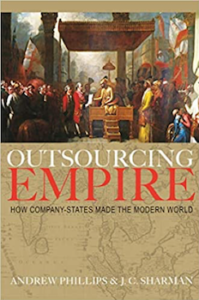The state we’re in: on company-states
Company-states have played an important role in South African history. This centres on the VOC or Dutch East Indian Company from the mid-17th century through to the late 18th century, and the British South Africa Company or Chartered Company from the late 1880s through to the South African War, but continuing for significantly longer in the territories which are now Zimbabwe. Important because these have considerably marked the places where their rule was exerted and imposed, which was often, and notably so in the case of Zimbabwe, through warfare, massacres and other bloody means. Important also because these brought with them a system of rule and governance that negotiated with and accommodated to, but also sat awkwardly at odds with, traditional authority. That is, as well as their commercial and other economic concerns, the company-states instituted organisational structures that imposed relations of ruling within their sphere of influence, with this latter increasing over time. And they did this operating alongside the prevailing ‘local’ traditional systems of ruling, but which were not centralised in the same way and were more consensual and based on reciprocities, such as labour given for preferments received, or compliance to traditional rule given for military protection received. The company-states did so because their charters, granted by governments in their places of origin, established their organisational structures and geographical sphere of competence, and also gave them the powers to set up semi-states with authority to rule in the name of their originating national state.
A much anticipated new book on Outsourcing Empire: How Company-States Made the Modern World by Phillips & Sharman has just been published.

Its view of the hybrid character of the very large number of company-states produced by mainly European powers over the time of greatest power and profitability of these – from the 13th century through to the earlier part of the 19th century – throws fascinating new light on how to better understand the state in the European context. In particular, in many ways this was not yet ‘the state’ in the sense of overseeing accumulation and distribution and monopolising force, but a form of governance which coexisted with other governance structures. With regards to the international context, national states-in-the-making shared governance and rule ‘abroad’ with the company-states it licensed or chartered. The result was a form of imperialism on the cheap and at remove, and which produced enclaves in which settlers as well as company employees lived and worked and might have a conflictual as well as client relationship with the company-state. But for the company-states concerned, the prime concern was profitability and therefore commercialism and trade, and in a more subsidiary way with militarism and rule. And though the later middle and late 19th century resurgence of company-states as a form of commercialised imperialism – in Southern Africa, enter the British South Africa Company – had largely the same characteristics, the context in which they operated was very different.
The analytical framework developed in Phillips & Sharman’s Outsourcing Empire makes much sense of what can be traced in primary sources concerning the South African context. It shows that its company-states operated initially largely through insinuation and negotiation, but with this overtaken by the frequent use of extreme forms of military and related violence in achieving their objectives in particular circumstances. These were also general attributes of company-states, including their semi-independent relationship to their European origins, their license to conduct their operations more or less as they wanted, and their fluctuating combination of insinuation and negotiation with considerable violence towards the people and traditional rulers of the places they operated in.
But there were also specific South African aspects, which this otherwise excellent book does not take much notice of. This is because it works from secondary literatures and covers a very wide range of these in tracking and theorising the activities, development and decline of company-states across large parts of the world; inevitably as a result there are gaps and some superficiality. Its focus is the British South Africa Company, Rhodes’ Chartered Company. In particular there is a reliance on a relatively small number of secondary references from the 1970s, and just one or two more recent ones, but much relevant research over a 50 year period with regards to South Africa and what became Zimbabwe is not drawn on. Doing so would in fact largely support the general argument of this most interesting book, and in some respects would have extended its analysis of the hybrid character of the company-state. Comparison of the VOC in the early period of its operations in South Africa, with the Chartered Company at the end of the later period, would be particularly interesting in this respect, but these are among the least developed discussions in the book. The VOC is dealt with more generally and not in its South African particulars, while the section on the Chartered Company is as already explained under-referenced.
Overall, though, the theoretical argument in this interesting book is powerful and convincing. Relatedly, there are ways in which the analysis of company-states in Outsourcing Empire requires revisiting the work of Elias on the European state, which forms the backcloth to the analysis of the racialising process in Southern Africa in Whites Writing Whiteness research, with its framework in mind. The wider analysis developed by Phillips & Sharman clearly requires rethinking this in some significant ways, something that will be pursued in future blogs and other work. Many books are described as thought-provoking, and this one actually is.
Andrew Phillips & JC Sharman (2020) Outsourcing Empire: How Company-States Made the Modern World. Princeton: Princeton University Press.
Last updated: 12 June 2020





